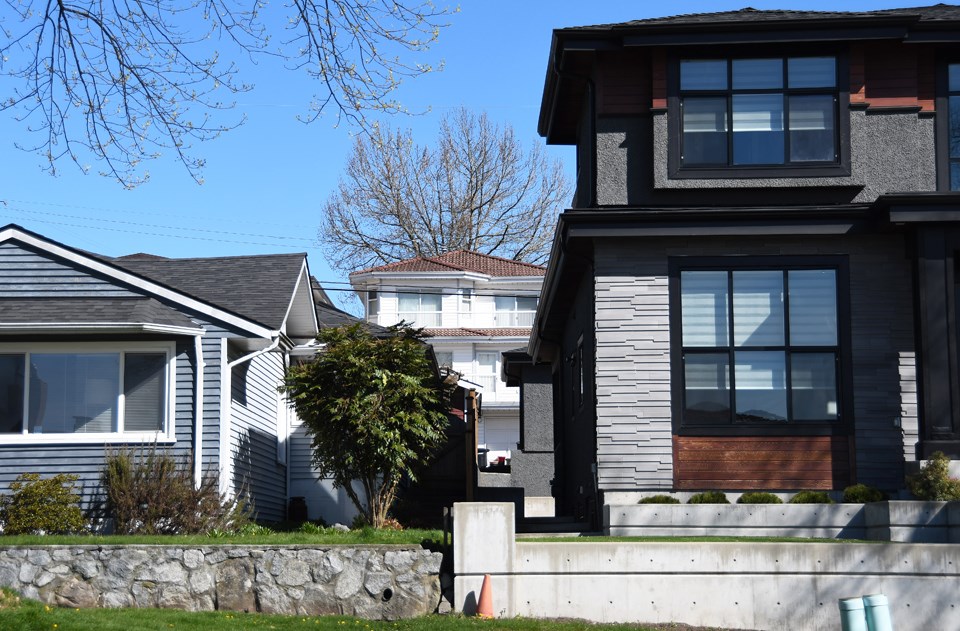Two Burnaby families might have saved themselves a long legal battle if they’d remembered the old saying about good fences making good neighbours.
It all started in 2015, when the Gill family (Amrik and Mohinder) decided to tear down their Napier Street house and build a new one, according to a ruling by B.C. Supreme Court Justice Ardith Walkem last week.
On the east side of their property, however, was a length of laurel hedge and a retaining wall topped with a cedar fence and a chain-link fence separating their lot from their neighbours', the Lightfoots (Thomas and Helen).
“The acrimony between the parties started with the early removal of the fence between the two properties that ensured the (Lightfoots’) sense of privacy and security,” Walkem said in an April 7 ruling. “This fence was removed earlier in the construction process than necessary. The dispute has blossomed into extended animosity between the parties.”
The Gills informed the Lightfoots about their plans to tear down the hedge and retaining wall, and the Lightfoots expressed concerns because the retaining wall supported a raised patio, walkway, steps and the two fences on the Lightfoot property.
“The (Gills) promised to discuss these concerns with their contractor,” stated the ruling.
But, when the house was demolished on Aug. 26, 2015, the contractor tore down the cedar fence as well without the knowledge or consent of the Lightfoots, according to the ruling.
“The (Lightfoots) were left without the wall for privacy (for the) duration of the construction,” the ruling stated.
When the Lightfoots contacted the Gills about the demolished fence, the Gills told them a delay in the demolition would have meant having to pay the excavator for a second visit, according to the ruling.
In September 2015, the Gills then proposed removing and replacing a section of the retaining wall since their engineer had warned them the wall could topple into the construction excavation.
The Gills confirmed they would pay for the renovation to the wall and any damage to the Lightfoots’ raised patio, walkway and steps.
When the retaining wall was replaced, however, it was built with capped pillars, and the Lightfoots didn’t like the look of the caps, which extend several inches over the width of the retaining wall.
They wanted those caps “shaved off,” according to the ruling, but the Gills liked them just fine.
The Lightfoots also wanted a cedar fence atop the retaining wall, while the Gills fancied a black metal fence.
“The (Gills) expressed the opinion that, as they paid for the fence, they should choose the type of fence that went in,” stated the ruling.
That issue had been resolved before the case made it to court, but Walkem said it “appeared to fuel this dispute.”
Lawsuit
In June 2019, the Lightfoots finally decided to sue the Gills for trespass for the removal of the cedar fence way back in 2015.
“They say they did not give permission for the (Gills’) contractor to enter onto their property and to demolish the fence when that event occurred,” stated the ruling.
Walkem was inclined to rule in the Lightfoots’ favour.
“I find that there was consent to the removal of the fence, but not to the timing,” she said. “It is not clear that the (Gills) themselves knew until after the fact that there was a significant cost savings to early removal, as opposed to waiting and removing the fence when the retaining wall was replaced. The fence was removed earlier than discussed to save the (Gills) money. The (Lightfoots) lost privacy and effective use of their property for over a year.”
There was only one problem with the trespass claim – it had been filed too late, and Walkem dismissed it.
But she did grant the Lightfoots an order declaring the retaining wall to be their property, since only one centimetre of it was determined to be on the Gills’ side.
Walkem also made a declaration allowing the Lightfoots to remove the capped pillars at their own expense.
To head off any further bad blood between the neighbours, however, she left them with a bit of advice.
“As an aside, I note that this dispute arose because the (Lightfoots) did not feel as though they were involved in decisions that impacted their property,” she said “My suggestion would be that they seek a solution to address the capped pillars that works for the (Gills) as well.”
Follow Cornelia Naylor on Twitter @CorNaylor
Email [email protected]



